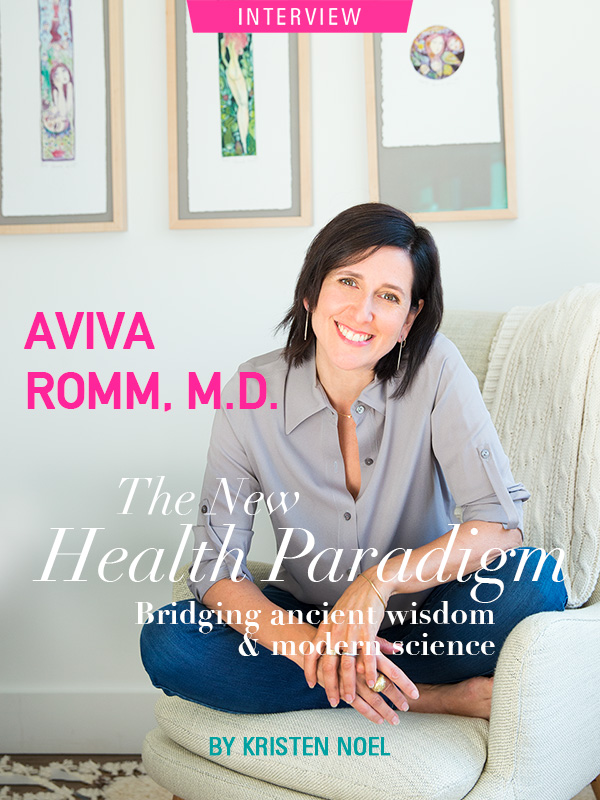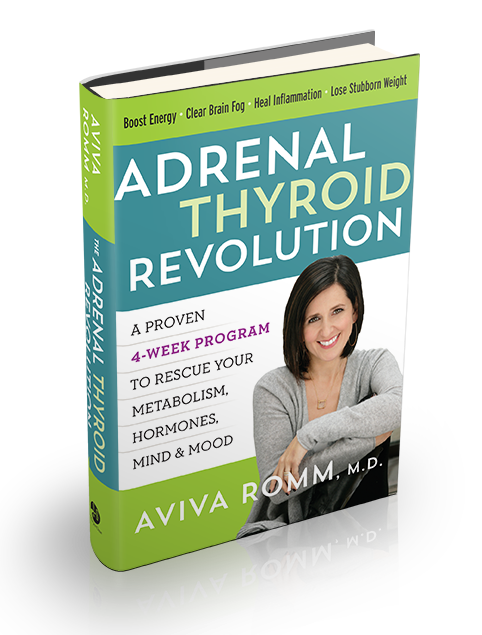Aviva Romm, M.D.
The New Health Paradigm
October 5, 2017, West Stockbridge, MA
Photographs by Bill Milles
I’ve started to see self-care as an act of civil disobedience, revolutionary behavior, saying to our society, “No, you can’t have my health.”
Kristen: Aviva, thank you for welcoming Best Self into your lovely home. I thought that I would start with a quote of yours to set the tone of our conversation.
Aviva: Uh-oh, what did I say?
Kristen: Don’t worry. [laughing]
“A couple of years ago, I made a really powerful decision for myself, and it was to trust my own self as my highest authority.”
I love that for a gazillion reasons, but it also makes me laugh because, I have a sense that knowing what I know about you — you’ve been doing that for pretty much your whole life. And although I have already provided you with an official title of ‘Hippie-At-Heart-Powerhouse’, I think I owe our audience an official introduction. So just bear with me for a second while I gush.
Aviva Romm is a midwife, herbalist, ecologist, mother, writer, and Yale-trained MD. She is the author of seven books. Her latest, this amazing book, The Adrenal Thyroid Revolution, was the #1 bestselling thyroid and immune health book. She’s a lifetime seeker with a rich 30-year journey along the path of integrated women’s health. Her mission is to empower others with tools to shift their health and reclaim their lives, and to bridge the conversation between conventional and natural medicine. She also spurred the creation of the first integrative medicine program at Yale University. Such a slacker!
Aviva: Yeah, I just sit around all the time. [smiling]
Kristen: You were really in the trailblazing trenches. You embarked on this path at a time when we weren’t technically calling food ‘organic’ and as you said, there were only four herb books on the market to reference. It was a time when none of this was really a mainstream conversation.
Aviva: No, it wasn’t. My family thought for sure that I had gone over the deep end and actually asked me if I had joined a cult because I was vegetarian. It certainly wasn’t the flavor du jour at that time.
Kristen: You truly personify this notion that anything is possible. Giving a little context here: Pre-nutrition studies and pre-med school at 14-years-old, growing up in a housing project and being raised by a single mom, you sat down and decided that you were going to write Johns Hopkins Medical School a letter asking to be admitted. I want to know, where does that chutzpah come from?
Aviva: That’s a great question. One, my mom is a courageous woman in her own way and she kind of embodied a fearlessness that was a role model for me in so many ways. She was really interested in local politics when I was young. Even though I was growing up in housing projects, some of our representatives were people like Nettie Mayersohn. I also went and heard Bella Abzug speak when I was a kid. You can’t not be inspired by her. This woman was just a rock.
Helen Reddy’s, “Woman, hear me roar,” was in the background of my childhood. So, in some way, I think the tacit messaging at that time was that I didn’t really have to hold back and be afraid.
By the time I hit my first year of high school, I was doing an almost two-hour commute to and from school. I gained 30 pounds during that really stressful year. I wasn’t sleeping; I got sick a lot. I just felt like something inside me was going to break. You know, everyone has a different resilience. I don’t know what guided me to just have a ‘woke’ moment and say, “I’ve got to get out of here. This is not good with me.” I was getting increasingly uncomfortable in my neighborhood.
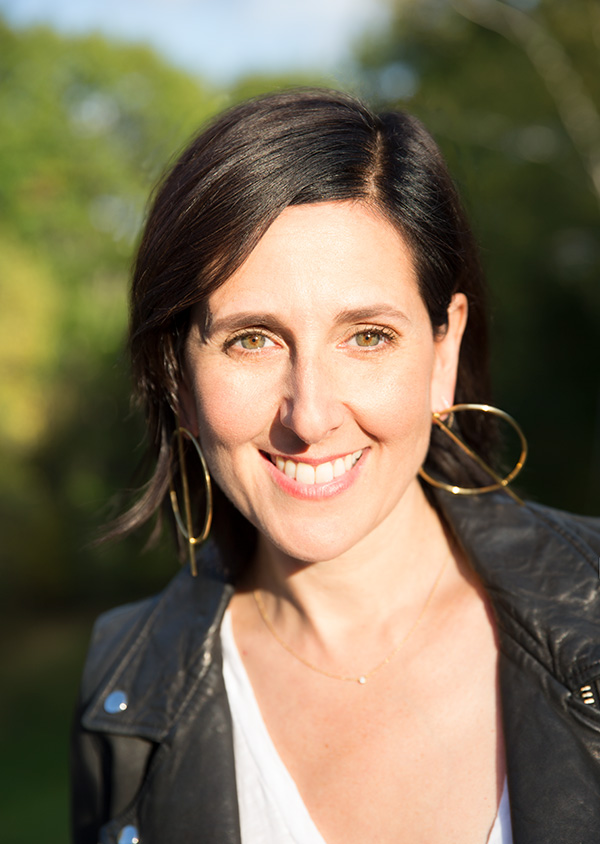
The commute and the pressure at the high school were not sustainable, and I really wanted to be a medical doctor. I just woke up one day, I don’t even know what inspired me at this point to write to Johns Hopkins, but whoever that person was who received my letter actually wrote me back.
Kristen: And let’s be clear. You weren’t on your computer filling out an application — you handwrote a letter, right?
Aviva: I literally wrote them a letter and said, “I’m ready for a change. I’d like to start medical school.” Someone wrote back and said, “You’re a little young.” I wasn’t even asking to skip college — I was asking to skip high school and college. [laughing]
Kristen: Somebody’s got that letter hanging up in their office. [laughing]
Aviva: Somebody does. If there are angels, that was one of mine. Whoever that person was said, “Well, there’s this school, Simon’s Rock in Western Massachusetts,” actually the town over from where we’re sitting and having this conversation right now, that has a program for young, gifted, or talented people who would like to skip high school and do something different. I applied, and then told my mom that I had applied and gotten an interview, and she said, “Go for it.” And I did.
Kristen: You exemplify a sense of fluidity in life because you’ve had this beautiful ability to keep an open mind to course correct. And when I use the term course correction, I’m not using it in the sense of making an error or a mistake, but rather saying, “Oh, I went this way, but now I’m feeling that I should go that way, and that it’s okay.” You went to Simon’s Rock for a year and a half, and surprise, surprise there was a course correction. Something else was stirring within you.
Aviva: Yes.
Kristen: You left school embarking upon a new path to study midwifery, and in the process you became skilled in nutrition, natural foods cooking, and back-to-land skills.
Aviva: Yes, I’ve actually made fires by friction many times. I know how to find the materials and I have an entire weird subset of skills.
Kristen: Let’s talk about that beautiful ability to listen to yourself because obviously, you have been listening to yourself your whole life. It is remarkable that you were able to hold onto that. Especially at that juncture in life, it is easy to get derailed, influenced by others, or to get locked into a job.
What was it that you held onto that allowed you to set off in a new direction?
Aviva: I think for me it’s really been a matter of answering how do I want to serve and what do I want to give, and what skill sets do I need to do that the most effectively?
When I went to college early, it was to be a physician. Then I saw that there was this whole set of problems in our world that I didn’t know existed previously; problems with ecology, agriculture, medicine, people having access to care, the way women were being treated in medicine. I just saw that there was this huge need, and what I was studying at that time, and the routes that conventional medicine offered to address those needs, weren’t for me.
I really sought out the path that would help me have the skill sets and the knowledge I needed to address those needs. That’s where the course correction occurred. When women like you or me would go into the medical model to get help, we were still facing that same kind of stonewalled, roadblocked, conventional, patriarchal, interventive model. I asked myself, “How do I meet this next level of need?” The answer was: I have to go into the system to be recognizable by the system, and recognizable by what the general public considers credible and informed — and that was medical school.
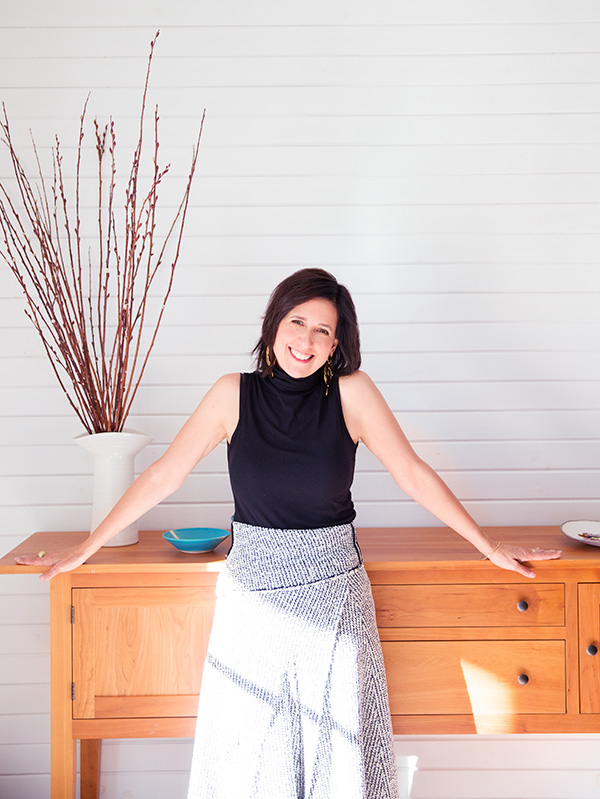
Kristen: Let’s go back. I think you’re glossing over this gift you have. It’s something spiritual, something within you that allowed you to align with your intuition, to listen to yourself and to pursue it. What would you say to people who may take a job or start studying something and then begin to feel the stirrings that there may be another path?
Aviva: That’s a really good question. One thing is that we are taught from an early age to look outside of ourselves for answers — and yes, sometimes we need that. But when it comes to our own inner-life guidance, I feel like if we actually get still for long enough… we know. I’m not sure what kept me on that path. Maybe it was a result of having gotten off the mainstream path so early.
Kristen: I don’t think you were ever on the mainstream path. [laughing]
Aviva: I kind of was. I was that sort of Spelling Bee, Science Fair kid, you know, the good student. I wasn’t necessarily the ‘good girl’. I remember getting sent to the Principal’s office in 9th grade for not standing up for the Pledge of Allegiance. I know it sounds so unpatriotic and it wasn’t about taking a knee or being unpatriotic; it was being told that I had to rather than being asked if I want to. I wanted to know why.
Kristen: It’s such a blessing that you were tuned in so early in life.
Aviva: There also wasn’t as much noise back then, right? There’s a lot of noise now. I think to some extent too, because I was so radically outside of the system, I wasn’t watching television. I wasn’t reading fashion magazines and thinking I should be a certain body type. I wasn’t wearing cosmetics. I wasn’t following the current trends. I didn’t have a TV. I was really reclaiming a fairly grounded relationship between nature and myself. I think the less noise we have in our lives, the easier it is to actually stay tuned into that inner guidance.
Kristen: Amen.
Aviva: I didn’t have a guru telling me what to do. I didn’t have teachers.
Kristen: For you, it’s just something that’s been there and you may not have even realized it.
Aviva: It’s true. There’s that term ‘heuristics’ — a sort of knowing what we know. I’ve been doing it for so long. I don’t know why I know it.
Kristen: You are the poster girl for this beautiful notion that regardless of demographics or circumstances, it is never too late. You ended up going to college early and then leaving school and studying natural practices and midwifery and having four children before deciding at 40: “Now, I’m going back to medical school” — and does.
It’s like this beautiful, coming-full-circle homecoming that took a lot of guts. Your story certainly debunks any limited thinking like, “Oh, that ship has passed.” Or, “I’m too old to go back to medical school.”
Aviva: Yes, or, “It’s going to cost so much.”
There is a cost. Going to med school meant I was going to be away from my kids whom I had been homeschooling at that time. I felt a lot of guilt and anxiety about doing that.
However, there were three things that have been said to me in my life that made a huge impact on me. One of my dearest friends, who spent time in Ghana, knew I was really feeling very guilty and conflicted about whether it was okay for me as a mom to take this step for myself. She said, “Aviva, in Africa women carry the babies, they build the houses, they tend the gardens, they do all of these things. It’s us here that think that there’s a separation between motherhood and work.”
Another was from a midwifery client of mine — a psychiatrist, an incredibly spiritual woman from Puerto Rico that I met in my early 20s. She said, “You know, here in the US, people say life is so short. It’s always hurry, hurry, hurry or it’s too late. There’s always this pressure. Where I’m from, we say, life is long.”
Kristen: I love that.
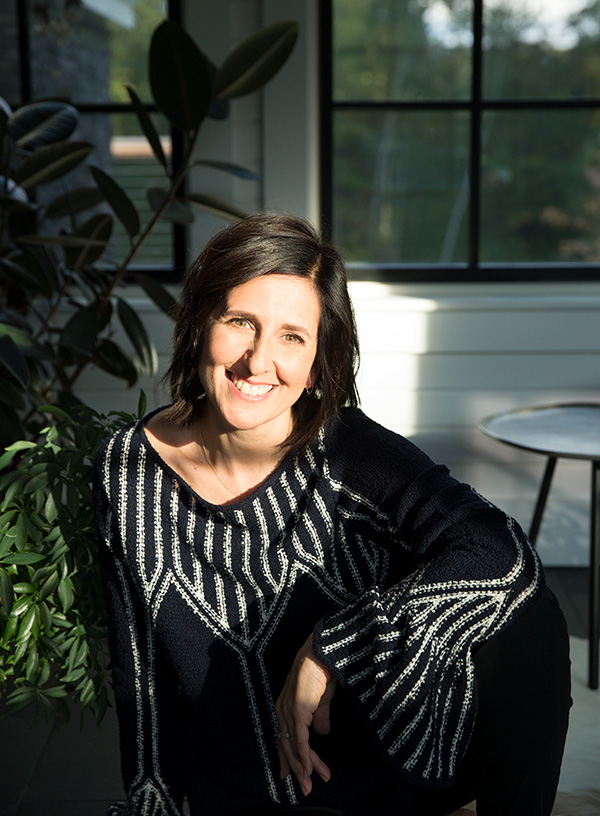
Aviva: I have to remind myself: Life is long. I recently read something that said, “So much of depression is regretting the past, and so much of anxiety is living in the worries of the future. How do we just be present?”
I was the first woman to finish college in my family. I was the first professional in my family. When I was in my mid-30s and getting closer to my application process, it was starting to take a lot more time. There were costs building up. At moments, I was thinking, I’ve got a kid going to college in a few years. I need to be thinking about this.
The father of one of my very dear friends was a diplomat and when I met him, he was about 82. He told me a story that when he was about 60, he had really wanted to go back to school. But he talked himself out of it because, “It’s going to cost me money. It’s going to take time. It’s going to be stressful for my family. I’ll have to give up my job, etc. But, now, I’m 82 years old. I would’ve had 22 years of doing what I always dreamed of doing.” That was such a clincher for me — the wisdom of an 82-year-old man.
Kristen: How fortunate you were to have those wonderful conversations.
Aviva: Yes. I actually had gotten into Yale at the same time that we had just signed the purchase papers on a house. I had to uproot my four kids and sell our house. It was a lot to process. I literally took the signed contract for Yale and proceeded to rip it up. I was like, I can’t do this to my family. I’m just going to tell Yale I’m not going to come. Then my husband taped it back together and sent it. So, the deal was done.
Kristen: I want to read another quote of yours:
“The story of conventional medicine that we’ve all been raised in with Western science is that the only information that we should trust is external, expert-driven, and based on a very patriarchal, anti-Earth, anti-body centered model. For me, it was a big shift in sort of reclaiming my feminism, reclaiming my feminine, and reclaiming my connection to Earth and planet, and also led me to have a really powerful trust in my body and to be connected to those intuitive messages.”
Aviva: Thank you for reading that.
Kristen: That’s beautiful because that’s sort of a synopsis of what I feel like this journey has been for you.
Aviva: It has been. My hope is to help other women, and men, be able to reclaim that connection to Earth, to our intuition, to our ability to believe that we can trust in our bodies and in ourselves, and to really trust in resilience — that we can heal, we can overcome obstacles, we can transform our lives. That’s what resilience is all about. It’s adapting, changing, shifting, having elasticity, and healing.
Kristen: Your life has been a series of bold steps in that direction.
Aviva: Oh, thank you. I like that.
Kristen: Were there moments where you questioned what you were doing? Was there pushback from other people?
Aviva: One of my favorite quotes is from Georgia O’Keeffe where she says, “I’ve been scared every minute of my life, but I’ve never let it stop me from doing anything.”
Absolutely, I’ve had fears that I was doing the wrong thing — that I was destroying my family and I would ruin my kids. I thought the midwifery community would hate me and the herbal community would judge me for going into conventional medicine. There were so many points along the way that I could’ve deterred myself from doing it, but I just held fast.
Trusting that intense inner drive was more than ego or fear, or just some goal for achievement; there was really something pulling me, like the gravitational pull on a compass to point north, that kept me in that direction. I fear failures, but I don’t fear them enough to not do it.
Kristen: I’m actually envisioning that young girl who wanted to know why? I think you’ve also spent a lifetime asking ‘why’.
Aviva: I have.
Kristen: It’s interesting how you mentioned questioning whether one community was going to be upset or not, because you were open to exploring alternatives. I see you as this bridge because you had an openness to recognizing that there could be value here and value there — to formulate a new conversation.
Aviva: Absolutely. One of the things about growing up in a housing project is that you grow up with a lot of diversity. For me, it’s about what can we add to, what can we learn from, from whom can we learn.
Kristen: After the Best Self World Summit, I had so many people write to me afterwards who were delighted by hearing your story, but had a lot of questions about your work with the thyroid and the adrenal glands. So, I am not letting them down.
Aviva: Okay. Let’s talk.
Kristen: I also wanted to note that when this thyroid bible first came out [holding up book] and I made a social media post on it, I received a tremendous response. People were coming out of the woodwork and I was thinking, Wow, I didn’t really even know that this was so pervasive.
Aviva: I didn’t initially set out to write a book on the adrenals and thyroid. However, I’d write a blog and within a couple of days, 20,000 people would respond and ask more questions. There was a prevalence of women who were not getting answers or who were being dismissed as if this was all in their head.
Women were fatigued, gaining weight, their hair was falling out, and doctor after doctor was saying, “No, you’re fine. You’re stressed,” or “It’s anxiety or depression. Let me put you on an anti-depressant or anti-anxiety medication.” So I realized, I needed to connect the dots of what was going on.
Kristen: But seriously, what the hell is going on? It’s as if all of a sudden, there’s this epidemic, right? It seems like every woman that I have spoken to either has a thyroid problem or knows someone who does — or has some issue with their adrenal glands. What is going on?
Aviva: What’s happening is we’re kind of at the critical juncture or a perfect storm, where all the different kinds of stressors that we’re experiencing — environmental, social, personal, economic, plus hidden stressors — are converging.
The Centers for Disease Control did a big study in 2016 and found out that in every single state in the United States, less than 14% of people are getting the fruits that we’re supposed to get every day and less than 60% are getting the vegetables. So on the one hand, we’re undernourished. On the other hand, we’re overstressed. It’s almost like our resiliency capacity is tapped to the max. We can’t stretch any further and we’re not putting into our bodies and our lives the things that help us repair.
Kristen: What are the symptoms that women are experiencing that are tipping it and getting them the doctor?
Aviva: First of all, what happens is we reach a critical max. A lot of us ignore little symptoms. We just subscribe to norms like, “Oh, I’m in my 40s, it’s normal to be a little forgetful.” I just had a patient whose doctor told her that, “You’re in your 40s, so of course you’ve gained 15 pounds.”
Kristen: All these benchmarks drive me nuts.
Aviva: You don’t have to suddenly gain weight and become cognitively deficient in your 40s, or stop sleeping, or watch your hair fall out. That’s not how it’s supposed to be. There are symptoms that we ignore and there’s the dismissal. It takes the average woman with an autoimmune disease five years to get a diagnosis. We do tend to dismiss things as just stress, and stress is a big factor in our health and with our hormones. There’s something that tips the iceberg.
For example, there may be an elderly family member, or a sick parent that you suddenly have to spend six months taking care of. I can’t tell you how many women contact me because their mom has breast cancer. Then six months later, their mom passes and they’re in my office with a thyroid diagnosis. When you’re under a prolonged period of stress, something ultimately tips the balance of what the body can respond to. It looks like you suddenly got diagnosed with a thyroid issue and yet, If you start to track back, for a lot of women, you can see…
Kristen: …the breadcrumbs.
Aviva: Exactly, this life-triggering trail of stress. Then you add to the fact that so many women are skipping meals.
Kristen: Let’s talk about women for a second.
Aviva: There’s a pervasive lack of self-care, and a lack of time to just hit the pause button and ‘be’ without feeling guilty. Some of us may actually hit the pause button, but even when we do, we’re sitting there watching some TV show, thinking we should be doing something different. So, we’re not really hitting the pause button.
Then you’ve got the lack of nutritional support. How many of us are constantly cleansing or detoxing? We’re disappearing to nothing sizes, not replenishing and nourishing ourselves. In fact, I wanted to write a book and call it ‘The Nourished Woman’. That’s what this book originally started out as, but my publisher said, “That just sounds like you’re helping women get fat. No woman is going to want to buy a book about being nourished.”
Kristen: Once we get through the thyroid and the adrenal issue, then we can be nourished.
Aviva: When you think about the thyroid, you think about it as the organ in your body. It’s this butterfly-shaped gland in your throat and its entire job is to regulate energy. If you’re old enough to remember the oil crisis of the ’70s, what we were told to do is turn down our thermostats to 66 when we went sleep, dress warmer during the day, and not burn more fuel.
Your thyroid is doing the exact same thing in your body. It’s recognizing that you’re under an energy crisis. You’ve been burning out for too long; you’re exhausted and you’re at that tipping point. We hear women say things all the time like, “I’m at the end of my rope. I can’t do this anymore. I’m burnt out.” These things we are vocalizing are symptoms. We have to start to recognize our emotional and mindset behaviors as symptoms. They’re not always physical things.
When the thyroid thermostat gets turned down, everything that is dependent on that fuel starts turning down, too, like your metabolism and cognitive function. If you’re in those fertility years, it’s saying, “Well, she doesn’t have enough energy for herself. How can we make enough energy for another person?” Your hormones go on the fritz and you suddenly find yourself wondering if you’re having a fertility problem.
There are certain nutrients that our thyroid depends on for energy like zinc, selenium, iron, vitamin A, plus adequate carbohydrates and proteins. Your body says, “Oh, we’ve got fuel to burn.” It’s really our body’s self-protective mechanism.
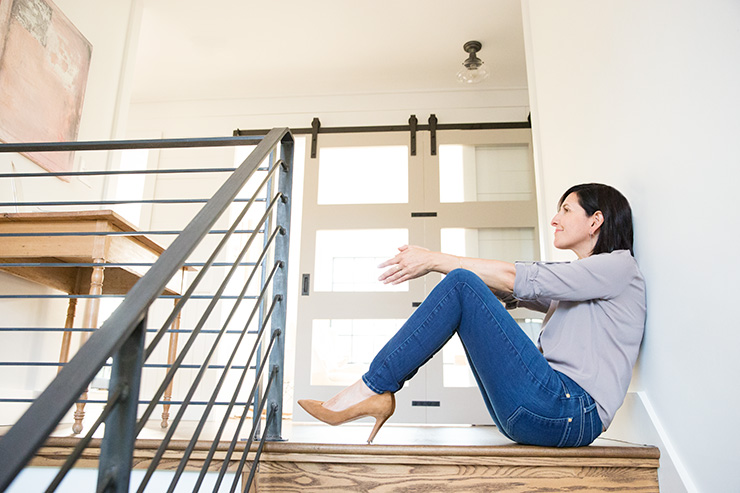
Kristen: Are there classic things that you see in your practice symptom-wise?
Aviva: Fatigue is a big one. And depression. In fact, it’s estimated that at least 15% of women who are on an anti-depressant have an undetected thyroid problem. They don’t need the anti-depressant. They need their thyroid attended to.
I hear women say this all the time: “I’m hardly eating anything. I haven’t changed a thing, but I’ve gained 15 or 30 pounds perhaps in the past three months.” Sometimes, it creeps up, but often it’s a pretty substantial weight gain in a short period of time. Another symptom is feeling cold all the time, or sluggish bowels and constipation. Any one of those symptoms doesn’t mean you have a thyroid problem. But when you start to add them together, it’s a good time to start getting checked out. If you have even three of the things that I’ve said at one time, let’s say you have some constipation, fatigue, and a little bit of low mood, it’s still worth getting checked out.
Kristen: How did you realize, “I’ve got to write this book. I’ve got to address this issue.”
Aviva: A number of things. One, and this kind of harkens back to why I went back to school to get my MD, was this kind of clarion call that something is going on with our environment and with our diets — this isn’t new. We can listen back to people who were saying this in the late ’60s/early ’70s, but it was very fringe information. Now, you have women who are saying, “Something’s wrong, but the medical profession isn’t listening to me,” and I felt for them. For mass shift to happen, for the medical profession to start listening to women’s voices, I knew I was going to need an MD degree.
To some extent, I took what the women whom I was working with in my medical practice were saying and combined it with answers I knew, identifying where the dots connected. I looked at root causes of stress, environment, food, our body’s ability to do the very functions that it’s meant to do — and asked, what are the things that we need?
It’s really about just getting this message out to not just the women in my practice, but to millions of women. Having the book written by a woman and by an MD, can also change the tide of what the medical profession is taking seriously.
Kristen: Exactly. You’ve got the ‘woo woo’ background — and you can slap that science down on top of it!
Aviva: I was out to dinner with a girlfriend one night and she said something about ‘woo woo’ and I said … You know, I love word play, and I realized woo is an acronym for ‘window of opportunity’.
I like to bridge those worlds and I think that there’s a tremendous amount of healing that can happen in things such as meditation, time in nature, better sleep, happiness, joy, the glass of red wine or the dark chocolate — the things that bring you pleasure.
Kristen: Dumping the martyrdom.
Aviva: Dumping the martyrdom, absolutely. We are so hard on ourselves. I am, too. I have to catch myself every day and remind myself, “I’m good enough. I’m enough. I’m doing enough,” and rein back that inner critical voice.
Kristen: Let’s also talk about adrenal fatigue and how that plays into all of this.
Aviva: Technically speaking, the adrenals don’t actually get fatigued. What happens is the adrenals are pumping out two things: one’s a hormone and one’s a chemical. The neurotransmitter chemical is called adrenalin, which most of us are familiar with. It’s that feeling we get on the roller coaster or watching the scary movie or the feeling we get when we are home alone and we hear a thump outside and your heart starts racing. You hold your breath for a second and get hyper alert. The other is this hormone cortisol, which is a life-survival, protective hormone. The Nobel Prize just went to people who were studying circadian rhythm. I’m so excited. This is my geek out area.
Kristen: So explain that for a second.
Aviva: We all have these internal body clocks. I like to think about it more as an orchestra, a conductor and sheet music. This master body clock is in the part of your brain called the SCN, the suprachiasmatic nucleus. Think of that as the conductor of an orchestra and your adrenals as the musicians in the orchestra. There are two little adrenals or two tiny glands that sit on top of our kidneys. They’re super small, like these little fatty yellow blobs. Then think of cortisol as the sheet music. The sheet music is going out to literally every organ and almost every cell in your body telling those cells and organs what time of day to boost this part of my immunity for optimal health.
These are very primitive mechanisms. What other parts of my immune system should I turn on at night when she’s asleep that can help her brain and her body detoxify, but not be so reactive as she needs to be in the day that would keep her immune system responding to viruses and bacteria. It’s fascinating. It tells us to basically poop in the morning or in the daytime and not poop while we’re sleeping.
Kristen: That’s a good thing. [laughing]
Aviva: These are good things. It tells our liver when to activate our gall bladder, our pancreas, literally every cell. What happens, though, is most of modern life is completely devoid of connection to this central clock. This central clock is triggered by light and dark, but we’re on our computers continuously. Our ancestors were basically going to sleep when it got dark out. Today we stay on our blue light of our computer or television screens until like, two seconds before we fall asleep, and then we’re back on it the minute we wake up in the morning.
I actually feel that so much of modern life in this culture, in the US in particular, is to blame. In Sweden, for example, they have a different sort of equation for what makes a happy, healthy, productive person and it has to do with family time. Bhutan has one of the highest global happiness indexes. They value different things than we value, and we have some of the lowest health and happiness indexes in the world. Basically, each of us is kind of considered a cog in the culture’s productivity machine.
I’ve started to see self-care as an act of civil disobedience, revolutionary behavior saying to our society, “No, you can’t have my health. You can’t have my physical health. You can’t have my mental wellbeing. You can’t have the last 20 years of my life where I’m on 15 different medications and in and out of the doctor’s office. No, you don’t get that. I deserve to take care of myself, and that means I get to hit the pause button.
Women have been fed this multitasking BS for too long. I remember when I was a kid, there was a commercial for a perfume called Charlie. She was the woman who could bring home the bacon and fry it up in a pan, and never let her husband forget he’s a man. I wanted my name to be Charlie. I really wanted to believe that we could do it all. Maybe we can do it all, but not all at the same time — and keep our health. Do we really even need to do it all?
Kristen: We get pretty stuck in our routines and think there is no other way of doing life other than the way we’re doing it.
Aviva: It takes a lot to live in this culture. I’m amazed at how anybody can pay their rent or their mortgage or their medical insurance. It costs a lot of money. Some of the countries that have better living quotients also provide their people with healthcare or provide their people with guaranteed college education.
We have a lot of pressures that keep us pushing and pushing, firing on all cylinders at all times. It all goes back to resilience. As human beings, we have an incredible capacity to do more and more, and we get along doing that for a long time. But then we get those little symptoms. Yet we ignore them and we keep doing more. Then the symptom becomes a constellation of symptoms until it becomes a syndrome or a condition resulting in things like diabetes or high blood pressure or serious depression.
I work really hard. I work a lot of hours. I love what I do and I put a lot into it. I know you do as well. I think the answer is in paying attention to those tiny symptoms as early as we can and recognizing that those are our body telling us: It’s time to pay attention.
A little bit of stress is actually really great for us. We have evolved to actually thrive with small amounts of it. A small amount of stress stimulates our immune system. It stimulates our cognitive function.
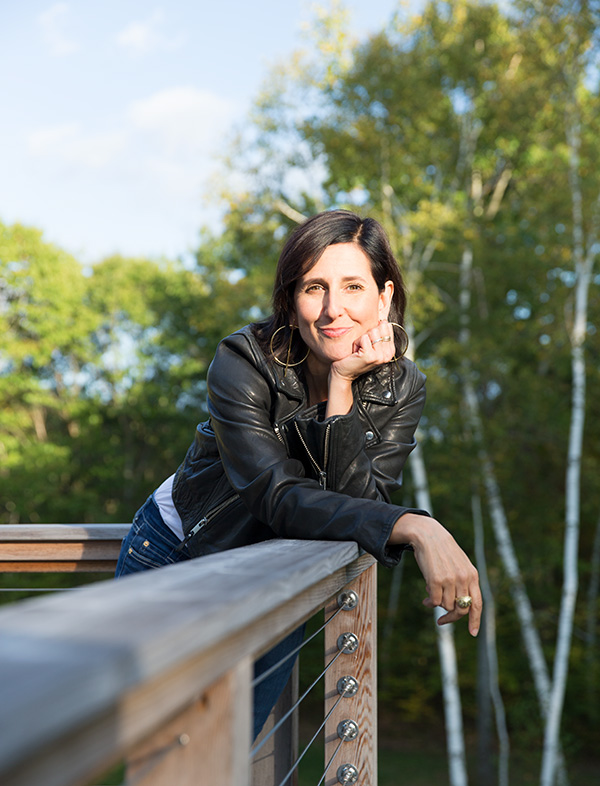
Kristen: The other thing about this book that’s really important to point out is that it’s not just about identifying the problems — it’s also about offering hands-on tactical solutions and dietary shifts. The good news is that we can heal.
Aviva: We can. One of my favorite things that I like to ask my patients is, “What if I told you, your body has the capacity to heal beyond anything you’ve ever been led to believe?” Which is not what we’re usually hearing from our doctors.
Kristen: Right. Instead we’re hearing, “I’ve got a pill for you.”
Aviva: Recently, while traveling at a major airport, I paid attention to the corridors lined with advertisements and billboards. Save a child with cancer or get your health and life insurance, give money to this local hospital, take this medication because it’ll help with your mood, etc. It’s like a hallway of sickness.
I was somewhere watching a television show and in that 50 minutes of programming, I think there were 5 commercials targeted at women, 35 to 55, and everyone needed HUMIRA or some other pretty big guns medication for an autoimmune disease. We get this idea that we’re sick and that the answer is a pill. Frankly we’re being poisoned by a lot of these pharmaceuticals. They’re just suppressing symptoms. They are just more tools to keep us going and producing, and going and producing.
Kristen: It seems like even in your practice, it must require certain amounts of handholding, nurturing, and coaching in a way. And allowing a woman to sit down in your office and unpack the whole story. It’s not just about helping them through a symptom, it’s really about helping them rescript their story, their life.
Aviva: I love how you said that. I was saying to someone yesterday that I feel like there’s as much ‘unlearning’ that we need to do in order to be healthy, as there is learning. We have so many stories. I love that idea of really helping women unpack it. It’s exactly what I do. It’s about simply believing that our bodies can heal.
Kristen: I wasn’t remotely familiar with that notion a couple of years ago, but now this is the most exciting thing.
There’s this great quote from you where you said, “Overcoming what so many are calling adrenal fatigue is a radical act of rebellion. It requires us to step outside of the status quo that demands we sacrifice our lives at the altar of high-pressure living, the never-ending quest for more achievement and acquisition, and instead look within to creating sustainable energy. Sustainability has to come not just in how we care for our world, but how we care for ourselves in the world.“
Aviva: Yes, that sums up very much this idea that we have the right to be well. Studies have shown that women who come home from a stressful day at work and take 15 minutes to unpack their stress — whether it’s a dance party or meditation or walking in nature — have completely different cortisol levels than when we don’t do those things.
Kristen: It’s not ‘all or nothing’, right? I think sometimes we feel that if we don’t make the perfect green smoothie or have the perfect meditation practice or go for the perfect Pilates class every day that we failed today, so just chuck the whole thing. But it’s really about making little shifts with big impact.
Aviva: Exactly. One of the things that I have gotten clear on is the power and poison of perfectionism and all the ‘shoulds’ that we put on ourselves. I’ve seen people drive themselves nuts thinking: “I should go to yoga” or “I should be doing this.” Then, they feel stressed out and what they really want to do is kick back, have a glass of red wine, and watch Game of Thrones, which may actually be more of a cortisol reset. It’s not like you have to do it perfectly every day.
One of the things that I’ve identified in my own life that kind of blew me away I also discovered while doing the research for this book, which is how perfectionism for women, all these ‘shoulds’, these patterns that we develop like being a good girl or the martyr that you mentioned earlier, are also signs that we’re in a kind of survival mode. Those very patterns can be driving this survival mode and be pushing us so hard. Those patterns can be what get our adrenal stress response very out of whack.
Kristen: So, Aviva, do you take a spoonful of your own medicine?
Aviva: I actually do. First of all, I’m very committed to not teaching and sharing things that I don’t walk my own talk, because that’s dishonest and it’s not fair. If I can’t do it, why would I think somebody else could do it? I really put into practice everything I share and I try to make sure that what I offer is realistic.
As for my doses of my own medicine: I’m very committed to my diet. I eat a healthy Mediterranean-style diet. I try to not ever skip meals and I try to really live a balanced life. I’m super committed to turning off electronics before I go to bed. I read every night, not on a Kindle or an iPad, but a real book with real pages. I try to get to sleep by 11. I try to get in some yoga, and some time in nature. I could probably be better about intense exercise, but that’s where I get my hikes in or get on a bike. I try to fit in mindfulness in my life.
Kristen: You also know when you really need it, right?
Aviva: I do. I really listen to my body.
If I have a little pinching feeling in my head and I’ve been working on the computer for too long, I know it’s time to push the pause button — to go get some water, get off the computer, go for a walk. Do something different. I try to pay attention to that.
It’s all about nourishing and replenishing. It’s about learning which foods you need to get replenished and have the energy to do what you need to. Then it’s about learning which foods may be a trigger for you.
The whole concept is what can you add in that activates your body’s innate healing powers and what can we remove that’s an obstacle to your body’s innate healing powers. The book walks you through what those are. Food being the first one, what can we add in for mind/body, whether that’s meditation or a hot bath, or kicking back and getting out of that perfectionist mode. And then, what life stressors can we take out?
We don’t have control over everything, but we can pick our priorities, right? Our to-do lists are stressing us out more. So, how do we start to look at our priorities in life and kind of curate the ones that we really can do, and then, put the others on the shelf for later or let them go completely?
It’s food, stressors, and then we look at some things that might be less obvious. What’s going on in your gut, for example. We know so much now about the microbiome, but there is still so much we don’t know. We know that the health of our microbiome impacts our stress resilience, our weight, our immunity, our moods, our mind, our focus. It’s such an exciting area.
So, addressing the gut again, what can we add in? Simple stuff: Lacto-fermented foods, a probiotic, the nourishment that feeds a healthy microbiome. And what can we take out? Artificial sweeteners that affect gut-lining health, too much sugar, and maybe for some women that glass of red wine isn’t appropriate at this moment because they may have some yeast overgrowth in their gut.
Then we walk through the body’s natural detoxification systems. Again, what can we add in to support how your body naturally wants to detoxify and what can we take out that’s adding to that overburden — that evolutionary mismatch between what we can handle and what we were meant to handle biologically, and what we’re being exposed to.
Finally, we walk through the immune system. Same thing. What does our immune system need to be healthy and what is impacting our immune system that might be adding too much burden.
It’s a 28-day process with this concept of nourishing food, healthy mindset and self-care woven through it. We’ve set up some strategic ways that the reader can do these questionnaires that will simplify things and get very individualized. I actually had a really good time writing it. It’s pretty much the plan that I walk my patients through in my practice.
Kristen: Which is fabulous. And let’s face it — when you start feeling good, you want more of it.
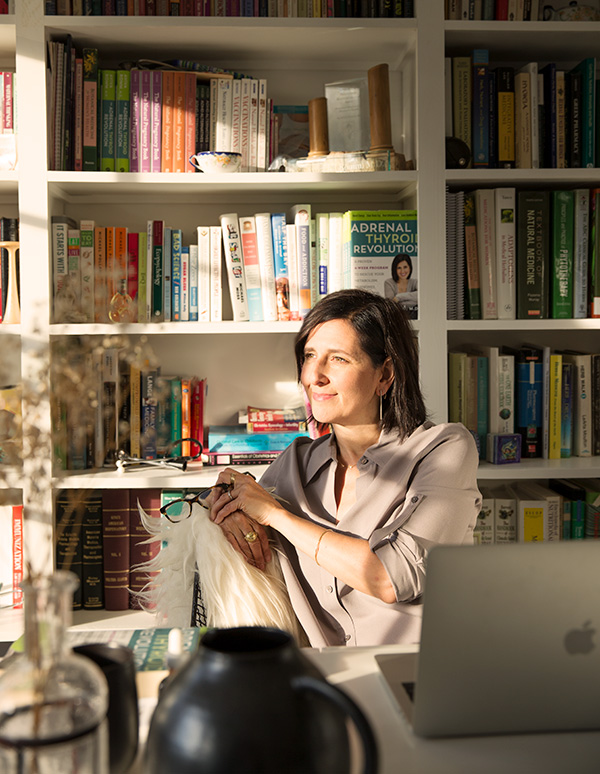
Aviva: Exactly. And if there was just one thing that I would say women could change right off, it would definitely be taking added sugar out of the diet. I know that sounds overwhelming, but what I find is that people think that sugar and sugary foods and quick carbs are giving them energy. Yet, if you really start to pay attention, you will notice how an hour or two after eating this, you are brain foggy and tired.
Kristen: We’re hungry.
Aviva: We’re hungry and we’re empty.
But in shifting that, we want to add in a self-care practice — a great one is a bedtime wind down. Think of the hour before bed as this sacred ritual; washing your face, brushing your teeth, maybe taking a hot bath with some essential oils, doing 10 or 15 minutes of stretching…
Kristen: …Lighting a candle.
Aviva: Yes, lighting a candle and getting in bed with a good book, not something crazy stimulating, but something really nourishing, relaxing, enjoyable, and letting yourself fall asleep naturally. No electronics. That is the hardest thing. I think giving up coffee is easier for people than giving up electronics! [laughing]
Kristen: There’s something that we touched on before, which was the word ‘legacy’. How fortunate your children and grandchildren are to have grown up with this conversation and not had to find their way around to it like we did.
Where do you see the evolution of this conversation going? What are we doing right? What are we doing wrong? And what scares you?
Aviva: We’re doing a lot of things right. I think as a culture, we’re catching on. When you see Walmart going organic, change is upon us. Walmart is really making an effort and is one of the leaders in organics for the masses now. That is so encouraging; it really makes me excited. When we hear about the microbiome, and not just on NPR, but also on more traditional news stations, we’re starting to catch on. I see #woke. We’re definitely getting ‘woke’ about some things.
What scares me most is that we’re experiencing a bit of a snowball or a domino effect. The domino started getting pushed about 20 years ago with the amount of environmental toxins we were being exposed to, global warming and antibiotic overuse. It’s going to take enough of us at a policy level to make big global shifts in some of the bigger crises that really may impact us.
I have women come in to my practice all the time who have been eating well for the past 15 years. They’ve been doing yoga. They’ve been doing meditation. They have a good lifestyle. But they come in with a diagnosis of breast cancer and they have no idea why. It’s all these external exposures that are beyond our control, and that’s what makes me sad.
Kristen: That is really scary.
Aviva: It’s really sad and it’s really scary. I don’t mean to be frightening, but it’s going to take all of us, individually and collectively.
One thing I have seen is the power of economics. The more of us that are demanding a shift, the more the shift is going to happen. People aren’t suddenly in Big Pharma and Big Agra and Walmart going, “Let’s go organic because we care about the planet.” Maybe some of them are, but it’s where the money is going, right? We see Amazon buying Whole Foods. There’s an incentive.
The more of us who are demanding and expecting self-care time at work, the more women who take time off when they’ve had a baby, the more of us that ask for things like meditation breaks or yoga class at a big corporation, the more of us who are looking for organics and alternatives to conventional medicine, the more change will be affected.
There was a study done this past year. Some researchers caught salmon in the Puget Sound; the fish had over 80 pharmaceuticals and environmental contaminants in it. We’re all getting Prozac. We’re all getting benzos (benzodiazepine). We’re all getting opiates. We’re all getting hormones — all the time.
None of us individually can stop that, but if we really make the changes with our money and those changes start to be seen in bigger businesses, there will be policy changes. We’re seeing that, but there’s going to be a lot of suffering for individuals before those shifts happen. I think that’s what scares me, but I’m optimistic of the shifts that are changing.
Kristen: Thank you for having stayed the course on this crazy winding road your life took you on because it did inspire a conversation, and it did create a really rich openness to cull what works for us, and to make it okay to listen to our intuition.
I think you’re a walking, talking, breathing, connecting-the-dots bundle of inspiration and I thank you for your work in the world, your continued work in the world and everything to come. I would love to close by asking you to read the dedication of this book for us. I think it would be a beautiful note to sign off on.
Aviva: I would love to.
“To all women who have felt unseen and unheard, you are not invisible and you are not alone. To all who have been told, ‘It’s all in your head’ — it is not. And to all who have felt you’ve been sleeping for too long, rise and shine. Let’s move mountains together.”
It’s based on a Chinese proverb that says, “When sleeping women wake, mountains move.” That’s what this book does.
Kristen: Thank you for your bravery in the world and for following your intuition and your heart, because when you pair the two, that’s how we move mountains. Thanks for moving those mountains, sister.
